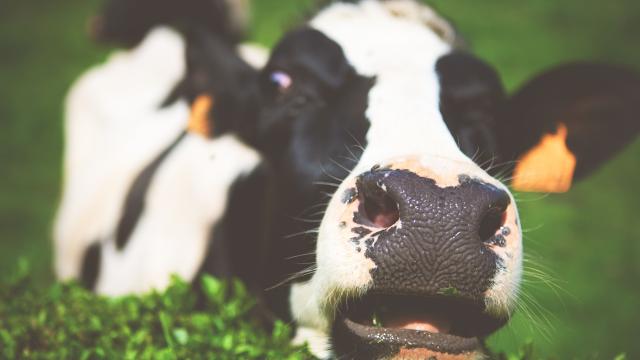As a decade-long vegetarian, I support just about any initiatives that might reduce Americans’ reliance on animal products. And while I come at my choice primarily from an animal welfare position, I also recognise that the impact of livestock, and red meat in particular, is taking a toll on our environment.
Popular Science editor-in-chief Joe Brown writes: “Livestock are responsible for 12 per cent of the greenhouse gases that are helping warm our planet [“¦] And red meats are the worst offenders: cows in particular are woefully inefficient at turning grass into people food – 1 per cent of their feed turns into calories we can consume, which is less than a tenth the turnover rate you get from a chicken – so it takes a lot of water and energy to raise them. The more of them we eat, the more of them farmers need to breed.”
(Side note: Because we love passing on tidbits of fascinating information, it’s worth sharing that while popular thought blames cow farts for the increase in methane levels damaging our atmosphere, cow burps actually play a major, and likely primary, role in this problem. That, and the ways in which their manure is managed.)
In an effort to encourage a reduction in red-meat intake, the folks over at PopSci started up a campaign dubbed ‘#NoRedOctober’.
Of course, another PopSci writer, Sophie Bushwick, argues in a post today that there’s already a better challenge for meat-eaters to grab on to: Meatless Mondays. By her numbers, which indicate a 35kg-of-beef annual intake by the average meat eater, the difference between taking one month off of eating red meat versus choosing a non-meat option every Monday is more than double: “No matter how many cows or pounds of beef you avoid consuming during #NoRedOctober,” she writes, “you’ll save 61 per cent more animals or meat by opting for Meatless Mondays instead.”
And, sure, we’re all for greater impact (and since October is also Vegetarian Awareness Month, might I toss this 100% meat-free Hungry Jack’s Whopper as a viable meal option?). But the bottom line here: when it comes to changing habits, you, not statistics, come first. Whether you’re drawn to a daily, a weekly, or a monthly process (or a go-for-it one-time challenge), the one that you’ll actually stick to is the one that will have the most impact.
[referenced url=”https://www.lifehacker.com.au/2019/10/taste-test-hungry-jacks-plant-based-whopper-burger/” thumb=”https://www.lifehacker.com.au/wp-content/uploads/sites/4/2019/10/Hungry-Jacks-vego-burger-2-410×231.jpg” title=”Taste Test: Hungry Jack’s Plant-Based Rebel Whopper” excerpt=”The Rebel Whopper is Hungry Jack’s first stab at a plant-based burger for the Australian market. Made from a mixture of legumes and natural oils, it’s being billed as a cruelty-free alternative to traditional meat. But how does it taste?”]

Comments
One response to “Which Is Better For The Environment: Meatless Mondays Or #NoRedOctober?”
Some readers know what I will say. Eat beef and run the risk of global warming, run the risk of poor health, and certainly add to the droughts.
I would like to introduce the term “humanity denier” as a term to combat, vegetarians and vegans. whilst there moral reasons are not unjust, taking any moral judgement to the point that denies your evolutionary disposition, is saying your against what you and your fellow humans evolved to be. that is the worst form of prejudice far worse then racism even.
How many vegetarians have actually had the surgery to remove there canine teeth for example hypocrit’s in for the cause but not in for what the cause would eventually change in them…. but hey its easy to be somthing whilst relying on the 100’s of generations before them that gave them what they deny and provides there current health why they play the denial game.
As for the plant foods over animal foods argument for climate change, humans playing god have never done it well and are unlikely to ever do it well, after all being multi generational vegetarians will reduce the intelligence of the species, unless we suddenly develop a different organ disposition, the brain loves very specific fats that are animal derived, and no vegetarian equivalent is as effective, or can be provided without bigger impact to the environment then the animal form provides.